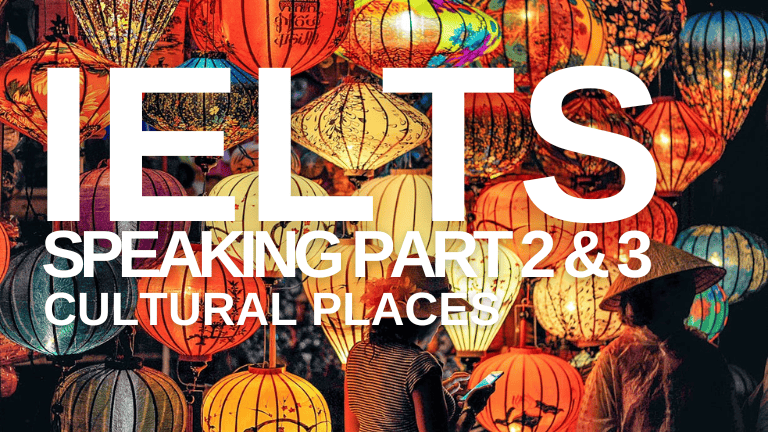
IELTS Speaking Part 2 & 3 – Cultural Place
IELTS Speaking Part 2
Describe a cultural place that you would like to learn the culture there (e.g. a library, museum, theatre)
You should say:
- Where it is
- How you knew this place
- What it is like
- And explain how the place is related to culture
I would like to talk about a cultural place I’d love to explore and learn more about—the cities of Hanoi and Da Nang in Vietnam. These places are rich in culture and tradition, and they have fascinated me for a long time.
I first heard about these cities from some friends in the United States who traveled to Vietnam. They couldn’t stop talking about the vibrant culture, delicious food, and the friendliness of the people. Later, I met a few Vietnamese staff members at a local restaurant in my area, and they shared even more about their country’s culture. Their stories and descriptions sparked my curiosity to experience it myself.
From what I’ve heard and seen in pictures, Hanoi and Da Nang are completely different from my hometown, Oregon. Hanoi, the capital of Vietnam, bustles with activity and is filled with historic landmarks, beautiful temples, and a unique blend of traditional and modern architecture. Da Nang, on the other hand, is known for its stunning beaches, ancient ruins, and the famous Dragon Bridge. The atmosphere seems vibrant and colorful, and the people’s way of life is deeply rooted in their traditions.
These places reflect Vietnamese culture, which stands apart from American culture. In Vietnam, the influence of Buddhism is strong, visible in their temples, festivals, and daily life. Food plays a big role, too, with dishes like pho and banh mi showcasing their unique flavors and ingredients.
Visiting these cities would offer me a chance to understand a culture so different from my own. It would provide an opportunity to appreciate their history, customs, and way of life while experiencing something completely new and exciting.
IELTS Speaking Part 3
- Does the culture of the past have an impact on today’s culture?
- Which is more important in terms of culture, literature or music?
- How do young people learn about different cultures?
- What kind of culture is popular among young people?
- How is a culture formed?
- How does the internet affect culture?
Does the culture of the past have an impact on today’s culture?
Yes, the culture of the past significantly impacts today’s culture, especially in the United States. For example, the tradition of young people moving out of their parents’ home at the age of 18 strongly influences American culture. In this context, independence and maturity are key, as young adults often work and attend university on their own. This practice encourages self-reliance, in contrast to cultures, such as those in many Asian countries, where children commonly live with their parents until they are older. This difference shapes distinct approaches to maturity and responsibility across cultures.
Which is more important in terms of culture, literature or music?
Both literature and music are integral parts of culture and each holds its own importance. Literature preserves and communicates a culture’s values, history, and stories, offering insight into the thoughts and beliefs of past generations. Music connects people emotionally and often expresses the mood, struggles, and triumphs of a culture. While literature provides depth and detail, music conveys emotions instantly and unites people across backgrounds. Thus, it is difficult to say one is more important than the other, as both express and shape cultural identity.
How do young people learn about different cultures?
Young people learn about different cultures in various ways, with living in a different country being one of the most impactful. By immersing themselves in a new environment, they experience the traditions, customs, and daily life of that culture. Additionally, exposure to cultures via media such as television, social media, and the internet raises awareness of cultural diversity. Traveling, reading books, and interacting with people from different backgrounds also allow young people to broaden their worldview and understand other cultures.
What kind of culture is popular among young people?
Social media culture has become increasingly popular among young people, significantly influencing their behavior and communication styles. This culture is fast-paced, highly visual, and centers on self-promotion or “pitching” one’s personal brand. Young people grow up watching YouTube and other platforms, where communication is animated, engaging, and designed to capture attention quickly. As a result, social media shapes how they communicate, making them more energetic and expressive. However, this can lead to more superficial communication, where appearance and popularity are prioritized over substance.
How is a culture formed?
Culture forms through a complex mix of geography, politics, history, and social dynamics. Geography plays a key role in shaping how people live and interact. For example, in many Asian cultures, people living near rivers or seas developed strong community bonds because survival depended on collaboration. In contrast, societies in expansive areas like the United States often formed less tightly-knit communities focused on individualism. Over time, these environmental and social factors shape traditions, values, and practices that define a culture. Culture is dynamic and evolves in response to changing circumstances and influences.
How does the internet affect culture?
The internet profoundly affects culture by making it easier for people to interact with and learn about different cultures. It allows people to discover diverse traditions, languages, and lifestyles from around the world, broadening perspectives. However, it also exposes people to negative aspects of cultures, such as stereotypes or controversial practices, which can reinforce biases or create misunderstandings. For younger generations who spend significant time online, the internet shapes perceptions of other cultures, sometimes highlighting negative portrayals instead of positive or nuanced aspects. Therefore, while the internet offers cultural exposure, it can sometimes present a skewed or incomplete picture.
Check Educatorian, IELTS Rizz IELTS WE and IELTS101
Check List of question for September to December 2024

Ian Tanpiuco is an ESL and virtual assistant. With a decade of experience, he has become an expert in his field. Dedicated to helping others achieve their goals, Ian works tirelessly in the classroom or as a virtual assistant.

